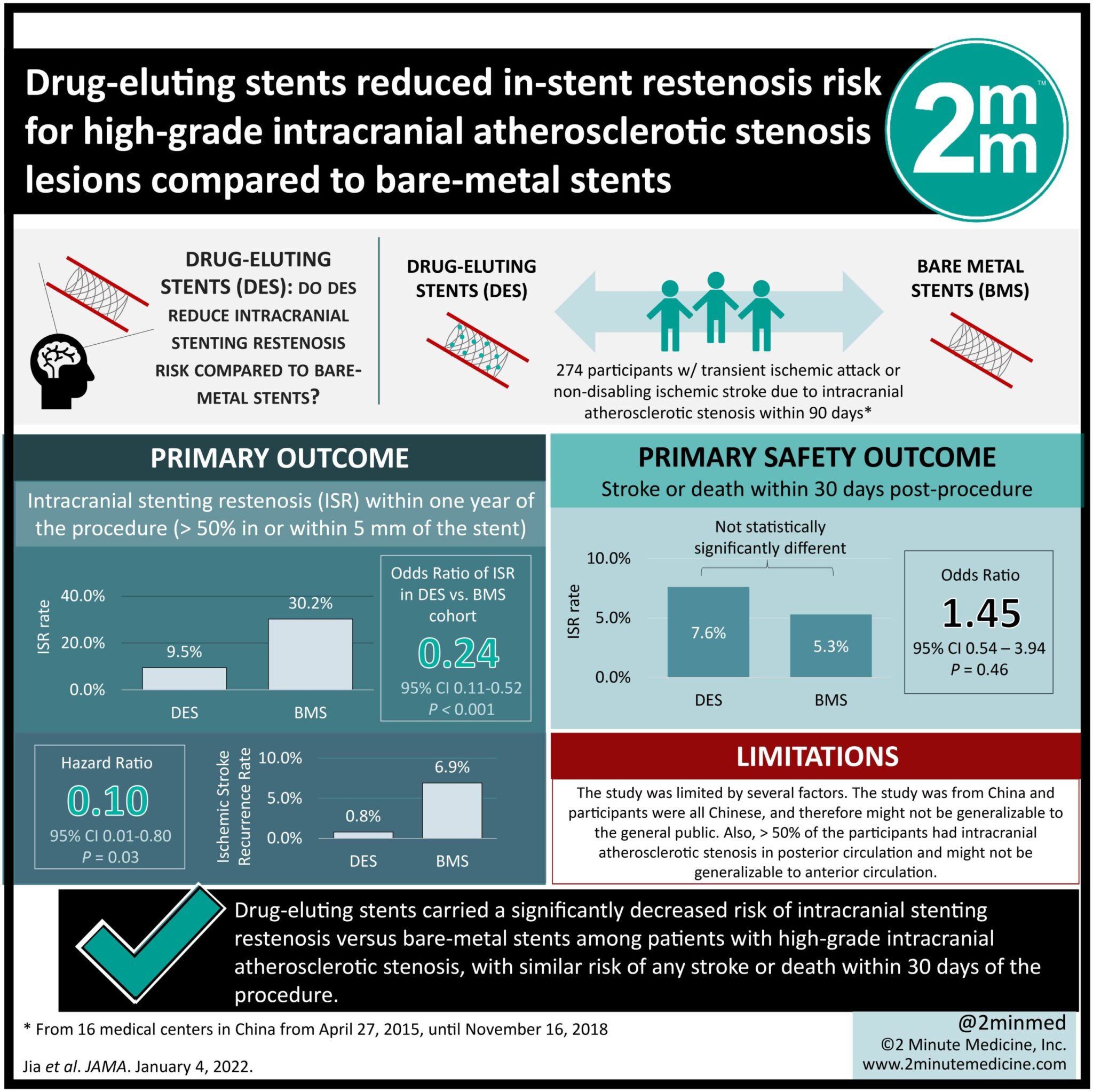#VisualAbstract: Drug-eluting stents reduced in-stent restenosis risk for high-grade intracranial atherosclerotic stenosis lesions compared to bare-metal stents
1. This randomized controlled trial demonstrated that drug-eluting stents carried a significantly decreased risk of intracranial stenting restenosis versus bare-metal stents among patients with high-grade intracranial atherosclerotic stenosis.
2. The risk of any stroke or death within 30-days of intracranial stenting was similar between patients who received drug-eluting stents compared to those who received bare-metal stents.
Evidence Rating Level: 1 (Excellent)
Study Rundown: One of the most common etiologies for ischemic stroke is intracranial atherosclerotic stenosis (ICAS). Intracranial stenting with bare-metal stents (BMSs) is used to treat select patients who do not respond to medical therapy alone; however, intracranial stenting restenosis (ISR) may occur after intracranial stenting and can lead to further ischemic events. Drug-eluting stents (DESs) were developed to reduce ISR risk. Despite some promising studies demonstrating reduced ISR with DESs, a randomized controlled trial has yet to be conducted. This randomized controlled trial (RCT) examined whether DESs decrease ISR and stroke risk in patients with symptomatic high-grade ICAS compared with BMSs. This study enrolled 274 participants (263 in primary analysis) and was conducted in 16 medical centres in China from April 27, 2015, until November 16, 2018. Patients were included if they suffered from a transient ischemic attack or non-disabling ischemic stroke due to ICAS (70%-99% stenosis) within 90 days of trial and were randomly assigned to receive a DES or a BMS. The primary efficacy outcome was ISR within one year of the procedure, which was defined as greater than 50% stenosis in or within 5 mm of the stent. The primary safety outcome was stroke or death within 30 days post-procedure. Despite similar baseline stenosis between groups, after a one-year follow-up, the median stenosis was 7.5% (95% CI: 2.4-12.4) less in the DES group compared to the BMS one. ISR occurred in 9.5% of patients in the DES cohort versus 30.2% of patients in the BMS cohort (odds ratio [OR]: 0.24 [95% CI: 0.11-0.52]; p< 0.001). Additionally, there was a significantly reduced risk of in target vessel ischemic stroke recurrence in the DES cohort (hazard ratio: 0.10 [95% CI: 0.01-0.80) from day 31 until one-year post-procedure. When comparing procedural safety and complications, the risk of any stroke or death within 30 days was comparable between DES and BMS groups, respectively (7.6% vs. 5.3%; OR: 1.45 [95% CI: 0.54-3.94]; p= 0.46). Overall, DES resulted in a reduced risk of ISR after one year compared to BMS with similar procedural risk of stroke or death. Notably, most arteries stented in the study were associated with the posterior circulation, which only receives one-fifth of cerebral blood flow; therefore, it is unknown whether these results are generalizable to the anterior circulation.
Click to read the study in JAMA
Relevant Reading: Efficacy and safety of drug-eluting stent for the intracranial atherosclerotic disease: a systematic review and meta-analysis
©2022 2 Minute Medicine, Inc. All rights reserved. No works may be reproduced without expressed written consent from 2 Minute Medicine, Inc. Inquire about licensing here. No article should be construed as medical advice and is not intended as such by the authors or by 2 Minute Medicine, Inc.







